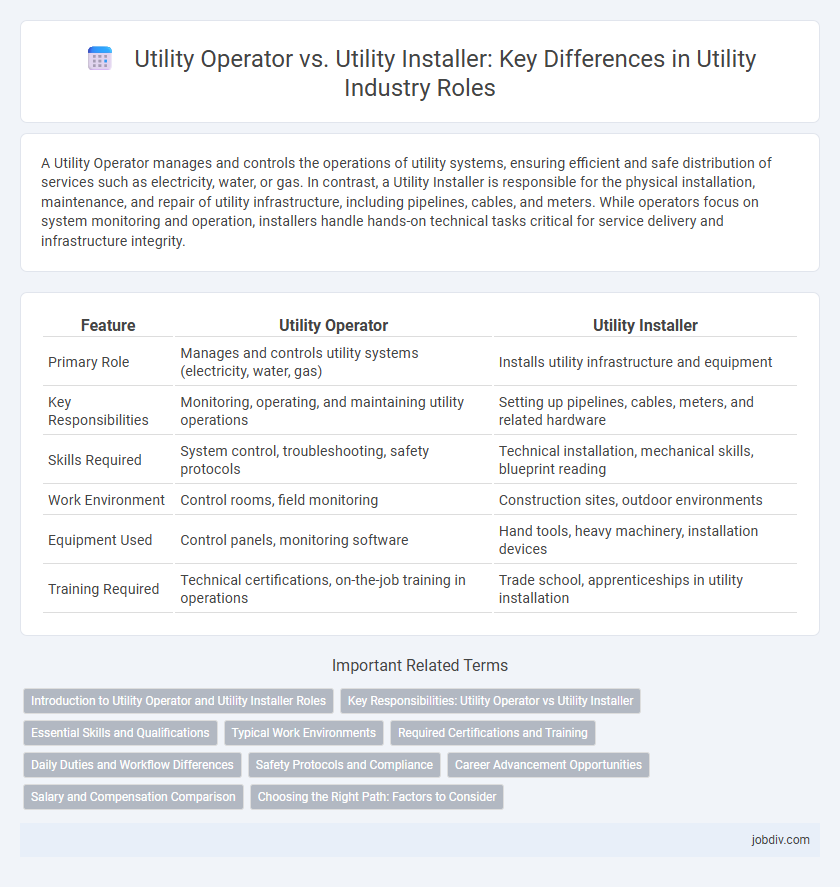A Utility Operator manages and controls the operations of utility systems, ensuring efficient and safe distribution of services such as electricity, water, or gas. In contrast, a Utility Installer is responsible for the physical installation, maintenance, and repair of utility infrastructure, including pipelines, cables, and meters. While operators focus on system monitoring and operation, installers handle hands-on technical tasks critical for service delivery and infrastructure integrity.
Table of Comparison
| Feature | Utility Operator | Utility Installer |
|---|---|---|
| Primary Role | Manages and controls utility systems (electricity, water, gas) | Installs utility infrastructure and equipment |
| Key Responsibilities | Monitoring, operating, and maintaining utility operations | Setting up pipelines, cables, meters, and related hardware |
| Skills Required | System control, troubleshooting, safety protocols | Technical installation, mechanical skills, blueprint reading |
| Work Environment | Control rooms, field monitoring | Construction sites, outdoor environments |
| Equipment Used | Control panels, monitoring software | Hand tools, heavy machinery, installation devices |
| Training Required | Technical certifications, on-the-job training in operations | Trade school, apprenticeships in utility installation |
Introduction to Utility Operator and Utility Installer Roles
Utility operators manage and control the equipment that distributes essential services such as electricity, gas, or water, ensuring continuous and safe delivery to consumers. Utility installers are responsible for setting up and connecting utility systems, including installing pipes, cables, and meters according to technical specifications and safety standards. Both roles require technical expertise, but operators focus on monitoring and maintenance while installers specialize in initial system installation and configuration.
Key Responsibilities: Utility Operator vs Utility Installer
Utility Operators are responsible for monitoring and controlling the performance of utility systems such as water, gas, and electricity networks to ensure safe and efficient operation. Utility Installers focus on the installation, repair, and maintenance of utility infrastructure, including pipelines, cables, and meters, often working on-site to connect new services to the grid. While Operators manage system functionality and respond to emergencies remotely or onsite, Installers ensure the physical setup and integrity of utility components.
Essential Skills and Qualifications
Utility operators require strong mechanical skills, knowledge of safety protocols, and the ability to monitor and control utility systems like water, gas, or electricity. Utility installers need technical qualifications in electrical or plumbing systems, proficiency with installation tools, and an understanding of local codes and regulations. Both roles demand problem-solving skills, attention to detail, and compliance with safety standards to ensure reliable utility service.
Typical Work Environments
Utility operators typically work in control rooms, maintenance facilities, and outdoor plant locations where they monitor and manage infrastructure systems such as electrical grids, water treatment plants, and gas pipelines. Utility installers primarily operate in the field, installing, repairing, and maintaining utility lines, pipes, and equipment in various outdoor environments including residential, commercial, and industrial sites. Both roles require adherence to safety regulations and often involve exposure to weather conditions, confined spaces, and physically demanding tasks.
Required Certifications and Training
Utility operators must obtain certifications such as the Occupational Safety and Health Administration (OSHA) safety training, as well as specific licenses for handling equipment and monitoring utility systems. Utility installers require specialized training programs and certifications in areas such as underground utility installation, pipeline safety, and equipment operation, often regulated by local or state authorities. Both roles demand rigorous adherence to safety standards and ongoing education to maintain compliance and operational efficiency.
Daily Duties and Workflow Differences
Utility operators oversee the daily operation and maintenance of utility systems such as water, gas, or electricity, ensuring consistent service delivery and system safety through monitoring equipment and managing controls. Utility installers specialize in installing and repairing utility infrastructure, including pipelines, cables, and meters, focusing on site preparation, connection accuracy, and compliance with safety standards. The workflow of utility operators centers on system performance monitoring and emergency response, whereas installers prioritize installation procedures, inspections, and troubleshooting during project execution.
Safety Protocols and Compliance
Utility operators manage the ongoing functioning and safety monitoring of utility systems, ensuring adherence to regulatory safety protocols like OSHA standards and NFPA guidelines to prevent operational hazards. Utility installers focus on the initial setup and physical installation of utility infrastructure, implementing strict compliance measures including personal protective equipment (PPE) usage, lockout-tagout (LOTO) procedures, and hazard communication to minimize installation risks. Both roles require rigorous training in safety protocols to maintain system integrity and protect workers from electrical, chemical, and mechanical dangers.
Career Advancement Opportunities
Utility operators typically manage and monitor equipment to ensure efficient energy or water distribution, offering career growth through specialization in system control or supervisory roles. Utility installers focus on the physical installation and maintenance of utility systems, with advancement opportunities often involving certifications in advanced installation techniques or transitioning to project management. Both career paths provide pathways to higher responsibility positions, though utility operators may advance faster into strategic roles due to their system oversight experience.
Salary and Compensation Comparison
Utility operators typically earn an average salary ranging from $45,000 to $65,000 annually, reflecting their responsibility in managing and maintaining essential service systems. Utility installers generally have a slightly lower salary range, approximately $40,000 to $60,000 per year, due to the hands-on installation nature of their work and varying certification requirements. Compensation packages for both roles may include benefits such as health insurance, retirement plans, and overtime pay, with utility operators often receiving higher bonuses tied to their operational expertise and system reliability.
Choosing the Right Path: Factors to Consider
Choosing the right path between a utility operator and a utility installer depends on factors such as required technical skills, job responsibilities, and career growth opportunities. Utility operators typically manage and control utility systems to ensure efficient service delivery, while utility installers focus on installing and maintaining infrastructure like pipes, cables, and meters. Considerations include physical demands, safety protocols, certification requirements, and long-term career prospects within energy, water, or telecommunications sectors.
Utility Operator vs Utility Installer Infographic

 jobdiv.com
jobdiv.com